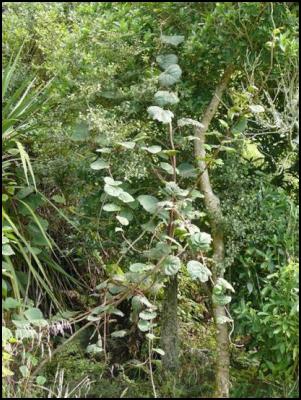Help prevent the spread of wild kiwifruit
Help prevent the spread of wild kiwifruit

As the kiwifruit picking and packing season gets busier, the region’s orchardists and farmers are being reminded to take a few simple precautions to make sure reject kiwifruit doesn’t become an environmental problem.
Environment Bay of Plenty Pest Plant Officer Des Pooley said that as the Bay of Plenty’s pack houses get busier picking and packing one of the region’s biggest export earners, there is always a quantity of reject fruit.
Mr Pooley said a number of farmers are especially keen to use this fruit as stock feed, and it’s great to see the fruit used.
“Farmers need to be aware however that kiwifruit can spread into our local environment and cause a serious pest problem.”
Wild kiwifruit is classified as a total control pest plant in Environment Bay of Plenty’s Regional Pest Management Strategy. This means landowners are required to control any naturalised or unmanaged plants found on their property.
If undetected, wild kiwifruit can establish and spread into native bush. It has the potential to become as bad as old man’s beard, a vigorous plant known for smothering large areas of native forest remnants.
Mr Pooley said the way kiwifruit is stored and fed to stock is very important.
“A number of birds, particularly waxeyes, find the fruit an easy food source. The seeds are spread far and wide in their droppings. Each fruit contains approximately 1100 seeds so the potential for its spread is substantial.”
Environment Bay of Plenty and New Zealand Kiwifruit Growers Incorporated work collaboratively to manage and fund the wild kiwifruit control programme.
With a few precautions kiwifruit can be successfully contained and prevented from spreading. Farmers, orchardists and packhouse workers are urged to cover stockpiles of reject kiwifruit.
“The use of windmesh or similar materials are ideal for this.” Mr Pooley said. “Secondly, when the fruit is fed out in the field, only feed the quantity that stock are able to consume.
“By carrying out these simple precautions, birds are less likely to spread viable seed in their droppings which will reduce the likelihood of further wild kiwifruit infestations.”
If you happen to come across wild kiwifruit, or would like more information please contact an Environment Bay of Plenty Pest Plant Officer on 0800 ENV BOP (368 267).
ENDS


 Gordon Campbell: On Why Leakers Are Essential To The Public Good
Gordon Campbell: On Why Leakers Are Essential To The Public Good Government: WorkSafe Makes Significant Shift To Rebalance Its Activities, Launches Road Cone Hotline
Government: WorkSafe Makes Significant Shift To Rebalance Its Activities, Launches Road Cone Hotline The Tree Council: Auckland Council Notifies Plan Change 113 Notable Trees
The Tree Council: Auckland Council Notifies Plan Change 113 Notable Trees ACT New Zealand: ACT New Zealand Celebration Brunch - David Seymour's First Speech as Deputy PM
ACT New Zealand: ACT New Zealand Celebration Brunch - David Seymour's First Speech as Deputy PM NZ Police: Operation Purple | Anti-Social Road User Gathering In Levin
NZ Police: Operation Purple | Anti-Social Road User Gathering In Levin New Zealand Defence Force: The Latest Update On The HMNZS Manawanui Response
New Zealand Defence Force: The Latest Update On The HMNZS Manawanui Response NZCTU: NZCTU Release Detailed Budget 2025 Analysis
NZCTU: NZCTU Release Detailed Budget 2025 Analysis


